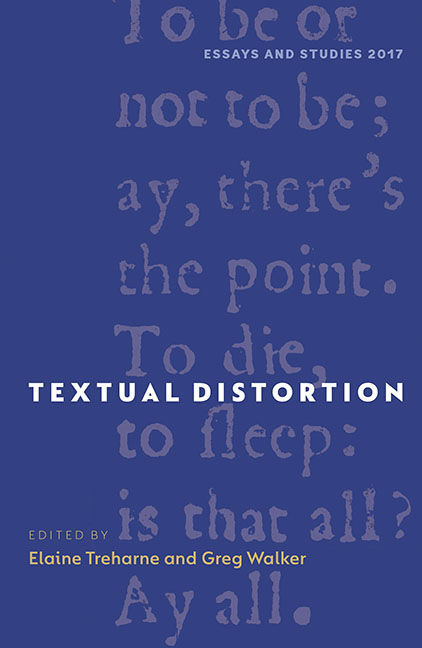Book contents
- Frontmatter
- Dedication
- Contents
- List of Illustrations
- Preface and Acknowledgements
- Notes on Contributors
- Introduction
- The Curious Production and Reconstruction of Oxford, Bodleian Library, Junius 85 and 86
- ‘Through a glass darkly’, or, Rethinking Medieval Materiality: A Tale of Carpets, Screens and Parchment
- Distortion, Ideology, Time: Proletarian Aesthetics in the Work of Lionel Britton
- Shakespeare and Korea: Mutual Remappings
- Dictionary Distortions
- Where Do Indigenous Origin Stories and Empowered Objects Fit into a Literary History of the American Continent?
- Distortion in Textual Object Facsimile Production: A Liability or an Asset?
- The Uncanny Reformation: Revenant Texts and Distorted Time in Henrician England
- The Presence of the Book
- Index
Dictionary Distortions
Published online by Cambridge University Press: 24 August 2019
- Frontmatter
- Dedication
- Contents
- List of Illustrations
- Preface and Acknowledgements
- Notes on Contributors
- Introduction
- The Curious Production and Reconstruction of Oxford, Bodleian Library, Junius 85 and 86
- ‘Through a glass darkly’, or, Rethinking Medieval Materiality: A Tale of Carpets, Screens and Parchment
- Distortion, Ideology, Time: Proletarian Aesthetics in the Work of Lionel Britton
- Shakespeare and Korea: Mutual Remappings
- Dictionary Distortions
- Where Do Indigenous Origin Stories and Empowered Objects Fit into a Literary History of the American Continent?
- Distortion in Textual Object Facsimile Production: A Liability or an Asset?
- The Uncanny Reformation: Revenant Texts and Distorted Time in Henrician England
- The Presence of the Book
- Index
Summary
Early on a sunny morning in Oxford in June 2005, I rode my bicycle to work at the offices of the Oxford English Dictionary (OED), and at the gates there was a large crowd blocking my way. They were protesters with megaphones and placards. The local television cameras were there, and some of the protesters had set up sofas on the sidewalk. They were potato farmers and members of the British Potato Council who were protesting against the OED for our definition of couch potato (a person who spends leisure time passively or idly sitting around, especially watching television). They wanted us to replace the phrase couch potato with their own invented term couch slouch because they felt that ‘couch potato’ was negatively distorting the image of the potato. As Kathryn Race, spokesperson for the British Potato Council, explained: ‘We are trying to get rid of the image that potatoes are bad for you.’ In other words, they believed the OED was giving the potato a bad name and they wanted us to fix it.
Lexicography has a rich history of people objecting to a dictionary's contents, be it the exclusion of a word, the inclusion of a word, or the definition of a word. A dictionary is seen as an authoritative text that holds the power to standardise language and prescribe its meaning, spelling, pronunciation and usage. Lexicographers may strive to describe actual usage; but the public, especially lobbyists, often wants them to prescribe and to present a sanitised version, or distorted version, of usage that suits their agenda. Both of these expectations are doomed to failure of course: the public, governments or lobbyists will always want more than the lexicographer can give; and, because lexicography is a human activity and inherently subjective, the lexicographer will almost always fail in objective description. Distortion in some form will always exist.
There are many examples of dictionaries being petitioned to present a sanitised version of culture and reality. In May 2016, an online petition called for the removal of the derogatory Singapore English term Chinese helicopter (a Singaporean whose schooling was conducted in Mandarin Chinese and who has limited knowledge of English), which had been added to the OED earlier that year.
- Type
- Chapter
- Information
- Textual Distortion , pp. 85 - 97Publisher: Boydell & BrewerPrint publication year: 2017
- 2
- Cited by



